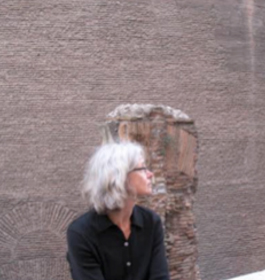October 2016, Issue #4
Making Kin: Part I
TABLE OF CONTENTS
Editorial
Lise Weil
Cynthia Travis
Listen with Your Feet
Jennifer Finley
Deer
 Magpies
Magpies
 What My Cat Would Say to Me
What My Cat Would Say to Me
Karen Mutter
Kinship and Murder
Melissa Kwasny
Another Letter to the Soul
Deena Metzger
Becoming Kin—Becoming Elephant
Kyce Bello
Correspondence with the High Country
 Correspondence with My Garden
Correspondence with My Garden
 Canticles of Drylands
Canticles of Drylands
Dominique Mazeaud
Material is Matter…is Mother
Kim Chernin
A Stuttering Kind of Worship
Nancy Windheart
Saved by Whales
Susan Richardson
Tope
Patricia Reis
After•Word Dining Out on the Great Divide: Donna Haraway, Thomas Thwaites, Frans deWaal, Karen Joy Fowler, Charles Foster and Helen MacDonald
Grace Grafton
Crow Mother, Her Eggs, Her Eyes
 Long Ago They Captured Our City
Long Ago They Captured Our City
Cynthia Anderson
Invoking the Salamander
Sudie Rakusin
Where I Stand
Kathryn Kirkpatrick
She and I
Camille Norton
After•Word Robin Coste Lewis’ Voyage of the Sable Venus and other Poems
Mandy-Suzanne Wong
Ama No Musume
Tricia Knoll
Divorce of the Night Sky
Andrea Mathieson
Listening for the Long Song
CODA
Kristin Flyntz
Embracing Duncan
Lise Weil
Just This
Melissa Kwasny
Another Letter to the Soul
You picked me from the litter as a brightness, rubbed me between finger and thumb. You placed me, and the bees, who are like-spirits, came. You gave them, through me, a place to come to. You provided me with properties, inaudible spells, invisible arrows that point to the hurt places. Illness of my friends: her failing liver, his failing nerves, earth-drought, flood, the poisoned animal. I know you have been testing me, first toughening the fragile frame. Inside, an infant cries and objects. You have set me apart like the bald eagle, found floundering in the river and put into the feeding cage. Long enough to gain its strength back, and then it fled. I admit I didn’t know that a broken wing could right itself. I forget about healing, though I grow more fond of birds, the poor nieces I can afford to bring the berries to. Sun’s out, you say, serving its broth of light.
****
The watercolorists are happy. They’ve picked their views and are sitting, barely moving, in long-sleeved shirts. Mystery and clarity is what we aim for as an achievement. You speak in the variations of wind. Upper reaches of the cottonwood, its adolescent limbs spurred on and off into a froth of soundings. Anxiety of ground-shadows as wind passes among the leaves. It stops, and the tiny insects descend. We experience you only in your arrivals, not departures, so strong you tear the tent from our hands. And yet your remains are tender, broken and soft, as if strung with beads of dew atop wet sand. Each one of us suffers, small things and joys. All of us are aging, having watched each other age. What are the past lives of the wind? It cycles through the channel where the deer carcass stinks. Where dinosaur bones protrude from the ancient banks.
****
Water. Mint. Water-mint. The braided currents at the bend of the nearby stream. Their fluid consonance. A granite boulder, like a sibyl behind summer leaf, shade-spattered with lichen and moss. Bachelard writes that, in human reverie, the rock imagines. Not we that imagine the rock. Because how could we have come here, have accepted so much, without having had a foundation to build on? You, then, as luggage, our library, perhaps our DNA? Entrance as noun: what we step through. Entrance as verb: how we are changed. What could we see if not movement? The sibyl measures each fish’s weight against the blue root of her own. The leafage separates in autumn into its individual tones. We say autumn moves us. That it is moving. Given the forecast. Given how easily the subject can be erased.
Notes:
This prose poem is from a new manuscript I am working on, provisionally titled Where Outside the Body is the Soul Today. When I began the poems, it was to challenge the prevailing assumption that words like “soul” and “spirit” don’t belong in our highly technological, secular world, and that, as well, they are not a fit subject for contemporary poetry. Contrary to my understanding that soul was something found deep inside us, as I wrote these poems, I began to discover that I can sense soul most clearly in others, especially the animals, plants, rocks, waters, and winds that people our world. Anima /animal: our intuition, even expressed in our language, that the soul is embedded in the animal body.

Melissa Kwasny is the author of five books of poetry, most recently “Pictograph” and “The Nine Senses,” as well as a nonfiction collection, “Earth Recitals: Essays on Image and Vision.” She co-edited, with M.L.Smoker, an anthology of poetry in defense of global human rights, entitled “I Go to the Ruined Place.” She lives in southwestern Montana.
Want to comment on any Issue of Dark Matter, fill out the form here.
Copyright © 2014-2021 Dark Matter: Women Witnessing - All rights reserved to individual authors and artists.
Email: Editor@DarkMatterWomenWitnessing.com
Please report any problems with this site to webmaven@DarkMatterWomenWitnessing.com
